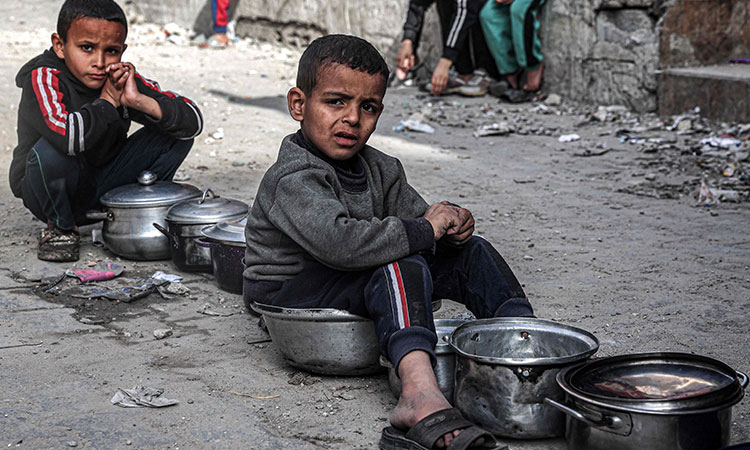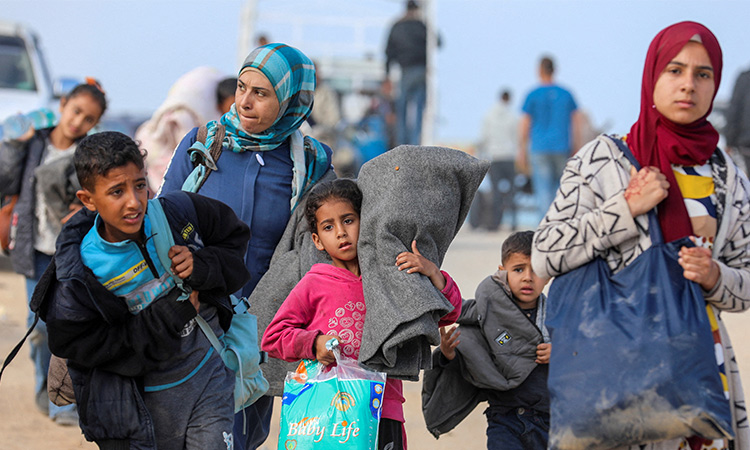'High risk' of famine in Gaza despite aid increase, says report

A Palestinian boy, Amjad Al Kanoo, who suffers from malnutrition is held by his mother, Nada, as they wait to be transferred for treatment outside Gaza on Monday. Reuters
The report by the leading international authority on the severity of hunger crises said nearly everyone in Gaza is struggling to get enough food and that more than 495,000 people, or greater than a fifth of the population of 2.3 million, are expected to experience the highest level of starvation in the coming months.
That's despite months of US pressure on Israel to do more to facilitate aid efforts, the installation of a $230 million US-built pier that has been beset by problems and repeated airdrops by multiple countries that aid agencies say are insufficient to meet vital needs.
The latest findings come from the Integrated Food Security Phase Classification, or IPC, an initiative first set up in 2004 during the famine in Somalia that now includes more than a dozen UN agencies, aid groups, governments and other bodies.
In its last report, in March, the IPC said that famine was "imminent” in northern Gaza, which has suffered widespread destruction and which Israeli troops have surrounded and largely isolated since the earliest days of the ground invasion.
That report said that around a third of Gaza's population was experiencing stage 5 hunger — the highest level of starvation.
In April, after Israeli strikes killed seven aid workers and sparked international outrage, Israel promised to ramp up aid, and it later opened additional land crossings in the north. The IPC said the amount of food deliveries to the north "sharply increased.”
But in early May, Israel launched ground operations in the southernmost city of Rafah, leading to the closure of the Rafah crossing with Egypt and repeated disruptions to the nearby Kerem Shalom crossing with Israel.
The air and ground operations also displaced more than a million people, most of whom had already fled their homes earlier in the war. Many are now crammed into squalid tent camps where they are at heightened risk of disease outbreaks, which the IPC said could exacerbate the hunger crisis.
"The humanitarian space in the Gaza Strip continues to shrink and the ability to safely deliver assistance to populations is dwindling,” the draft report said. "The recent trajectory is negative and highly unstable. Should this continue, the improvements seen in April could be rapidly reversed.”
Children, especially those with underlying medical conditions, are particularly vulnerable.
A separate group of experts warned earlier this month that it's possible that famine is already underway in northern Gaza. The Famine Early Warning Systems Network, or FEWS NET, said the ongoing war and restrictions on humanitarian access impeded the data collection to prove it.
Stage 5 hunger is equivalent to famine, but the IPC only declares an entire area to be in famine when 20% of households have an extreme lack of food, 30% of children suffer from acute malnutrition and at least two adults or four children per 10,000 people die daily.
Israel says it allows hundreds of trucks to enter through multiple crossings on a near-daily basis and blames UN agencies for not distributing it, saying containers are stacking up at Kerem Shalom, Gaza's main cargo terminal.
UN agencies and aid groups say they often can't access Kerem Shalom because of fighting in the area and that Israeli restrictions, difficulties coordinating with the army and the collapse of law and order greatly hinder their work. They say it's impossible to address the crisis without a complete cease-fire.
The United States has rallied international support behind a proposal that would lead to the release of the remaining hostages and a permanent cease-fire, but neither Israel nor Hamas have fully embraced it.
"The crisis in Gaza has reached another breaking point,” European Union foreign policy chief Josep Borrell said this week in a joint statement with EU crisis coordinator Janez Lenarčič.
"The delivery of any meaningful humanitarian assistance inside Gaza has become almost impossible and the very fabric of civil society is unraveling. Starving civilians are resorting to desperate measures to access the limited aid that trickles in,” they said.
Associated Press







